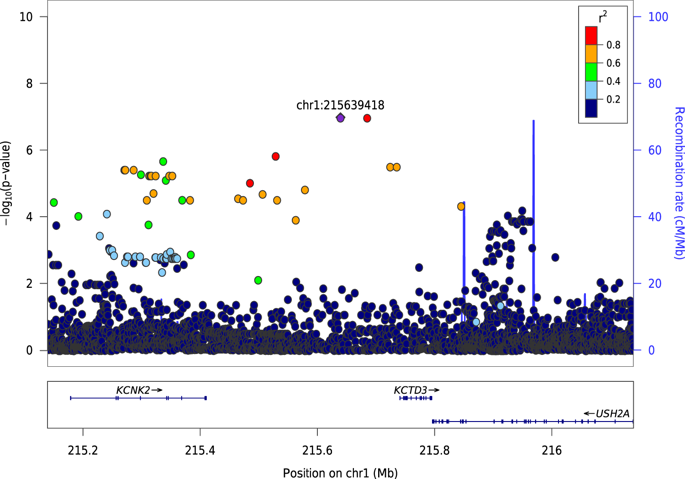Translational Psychiatry ( IF 5.8 ) Pub Date : 2019-02-04 , DOI: 10.1038/s41398-019-0397-6 Qian Peng 1 , Chris Bizon 2 , Ian R Gizer 3 , Kirk C Wilhelmsen 2, 4 , Cindy L Ehlers 1

|
A limited number of genetic variants have been identified in traditional GWAS as risk or protective factors for alcohol use disorders (AUD) and related phenotypes. We herein report whole-genome association and rare-variant analyses on AUD traits in American Indians (AI) and European Americans (EA). We evaluated 742 AIs and 1711 EAs using low-coverage whole-genome sequencing. Phenotypes included: (1) a metric based on the occurrence of 36 alcohol-related life events that reflect AUD severity; (2) two alcohol-induced affective symptoms that accompany severe AUDs. We identified two new loci for alcohol-related life events with converging evidence from both cohorts: rare variants of K2P channel gene KCNK2, and rare missense and splice-site variants in pro-inflammatory mediator gene PDE4C. A NAF1-FSTL5 intergenic variant and an FSTL5 variant were respectively associated with alcohol-related life events in AI and EA. PRKG2 of serine/threonine protein kinase family, and rare variants in interleukin subunit gene EBI3 (IL-27B) were uniquely associated with alcohol-induced affective symptoms in AI. LncRNA LINC02347 on 12q24.32 was uniquely associated with alcohol-induced depression in EA. The top GWAS findings were primarily rare/low-frequency variants in AI, and common variants in EA. Adrenal gland was the most enriched in tissue-specific gene expression analysis for alcohol-related life events, and nucleus accumbens was the most enriched for alcohol-induced affective states in AI. Prefrontal cortex was the most enriched in EA for both traits. These studies suggest that whole-genome sequencing can identify novel, especially uncommon, variants associated with severe AUD phenotypes although the findings may be population specific.
中文翻译:

与酒精相关的生活事件和物质诱发的情感症状的遗传位点:索引成瘾的“阴暗面”
在传统 GWAS 中已确定有限数量的遗传变异作为酒精使用障碍 (AUD) 和相关表型的风险或保护因素。我们在此报告了美洲印第安人 (AI) 和欧洲裔美国人 (EA) 中 AUD 特征的全基因组关联和罕见变异分析。我们使用低覆盖度全基因组测序评估了 742 个 AI 和 1711 个 EA。表型包括:(1) 基于 36 个反映 AUD 严重程度的酒精相关生活事件发生的指标;(2) 伴随严重 AUD 的两种酒精诱发的情感症状。我们确定了两个与酒精相关的生活事件的新位点,并获得了来自两个队列的汇合证据: K2P 通道基因 KCNK2 的罕见变异,以及促炎介质基因 PDE4C 中罕见的错义和剪接位点变异。NAF1-FSTL5 基因间变异和 FSTL5 变异分别与 AI 和 EA 中酒精相关的生活事件相关。丝氨酸/苏氨酸蛋白激酶家族的 PRKG2 和白细胞介素亚基基因 EBI3 (IL-27B) 的罕见变异与 AI 中酒精诱导的情感症状独特相关。12q24.32 上的 LncRNA LINC02347 与 EA 中酒精诱导的抑郁症独特相关。主要 GWAS 发现主要是 AI 中的罕见/低频变异和 EA 中的常见变异。肾上腺在酒精相关生活事件的组织特异性基因表达分析中最丰富,伏隔核在 AI 中酒精诱导的情感状态中最丰富。前额叶皮层在这两个特征的 EA 中都是最丰富的。 这些研究表明,全基因组测序可以识别与严重 AUD 表型相关的新变异,尤其是不常见的变异,尽管这些发现可能是群体特异性的。































 京公网安备 11010802027423号
京公网安备 11010802027423号